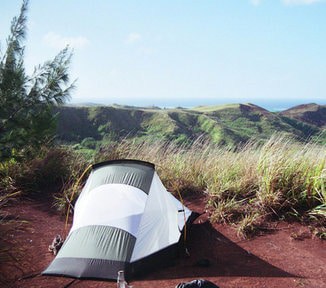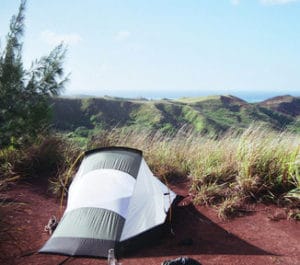
A camping safety checklist honestly isn’t something I’ve put much thought into in quite a while. However, sometimes it’s easy to get caught up in seeing the world through your eyes and not thinking about other points of view. This is as true of the outdoors as it is anything else.
While I’m still a proponent that everyone should spend more time enjoying nature, this focuses on something I honestly don’t think about as much: safety. Don’t get me wrong, I take all proper precautions.
That being said I’m six feet tall, have sported a mountain man’s beard since I was 19, and as one friend put it: “You’re built like a solid keg with giant tree trunks for legs.”
In other words unless it’s an extraordinary situation I really don’t have to worry about my safety much. But not everyone is six feet tall. Not everyone looks like a scary mountain man who could wrestle a bear. Sometimes it’s easy for me to forget that there are built in advantages to being who I am. That’s easy to take for granted.
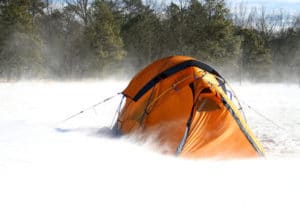
So while I don’t think much about whether or not it’s safe to camp unless I’m in the heart of bear country or preparing for a wilderness survival challenge, others do. Fair enough. Safety matters, and any question about safety is going to be a legitimate one.
While we’ve received plenty of e-mails asking about product reviews, specialty outdoor activities (winter camping, wilderness survival, etc.), and a few inquiries about living in Alaska, there have also been a surprising number of questions asking whether or not it’s safe to camp solo.
So a small sample of the questions we’ve received have been:
- I’m a young woman, is it safe for me to camp solo?
- I’m a retiree, is it safe to camp alone?
- I’ve thought about going thru hiking – but is it safe if I’m BLANK (female, foreign, solo, etc.)
- I want to camp more but I don’t know if it’s safe because BLANK
Fair enough. These are legitimate concerns if you’re not built like an NFL linebacker or defensive lineman. That being said, Jon and I both agree that camping solo is overwhelmingly a safe venture the far majority of the time.
The idea of danger lurking around every corner is way overblown past reality, and 95%+ of the time (maybe even 99% of the time) you really have nothing to worry about at all.
But bad things do happen. As with anything in life, there are risks when camping solo. The good news is you can take steps to keep the odds in your favor. While no one completely controls their fate, you can definitely shift the odds in your favor.
Table of Contents
You Basic Camping Safety Checklist
Keep in mind that this is a general checklist. You always want to make sure to adjust based on any special challenges or situations that are obviously going to come up. Winter camping is a different situation than normal summer camping. Tent camping differs from a public cabin, and there are major differences from a local campsite to a thru hike that puts you in the middle of nowhere.
#1: Let People Know Your Schedule
This is always a good idea if you’re traveling solo for any reason. Let someone know where you plan to be going, how long you plan to be gone, and when you plan to be back. If you’re schedule is tight, let them know, if it’s loose and you might wander for a bit, let them know that, too.
This way someone will know where you were planning to be and when, and there should always be a hard return date or a date you’ll contact them by. This way you can set your schedule, have someone waiting for that call, and a set call to get authorities checking up on you if you don’t check in.
Even on really impromptu trips I’ll often message a friend on Facebook or leave a note letting people know I should be back by whatever day, or telling them to reach out to me by a certain date or time if they haven’t heard from me.
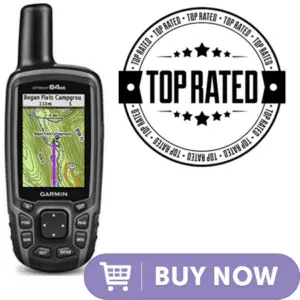
#2: Take Advantage Of GPS
Many smartphones have GPS apps that can be useful (as long as you are in an area with decent cell phone reception), but even more importantly there are many devices that allow the power of satellite GPS to be used by anyone.
This will help you avoid getting lost, and many of these also have an SOS type signal attached that allows a person who is lost, hurt, or otherwise needs assistance. While the smartphone app is convenient for some, we strongly recommend an additional GPS device.
This can help you be prepared for the most common dangers when camping or hiking alone. We’ve talked about a few outdoor accessories that are GPS based. Having even one of these will help you avoid getting lost, or find your way back to camp if you are.
Two of our favorites: GPS watches for runners & handheld GPS for hunters.
Always go with some type of GPS you can keep on your person.
#3: Make Local Friends (when applicable)
Going camping solo (or hiking solo) doesn’t mean that you necessarily have to be alone. Whether visiting a local campsite, a national park, or hiking a popular trail, there are often many others out and about who are very social, love meeting new people, and tend to look out for one another.
The video at the end of this article is from a thru hiker who goes by the trail name Dixie who talks a lot about this, and her experiences hiking individually as well as with a small group. It’s an excellent watch for more on this.
Otherwise don’t be afraid to introduce yourself to your neighbors if you’re camping at a public campground. Outdoor people tend to watch out for one another which is a safety benefit, but you also meet some stunningly awesome people, as well!
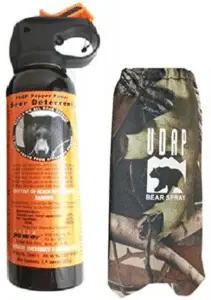
#4: Arm Yourself Legally
This one is going to be a bit controversial depending on who you talk to, but this can mean many things. If you’re good with a gun and have a legal concealed carry, that’s an option. Even if you’re in the 2/3 who don’t, there are other great options.
If you’re camping you have every excuse to carry a hatchet, carry a big knife, and in bear country a can or two of bear spray.
Two of those three non-gun options are exceptional survival tools in addition to everyday camping gear, and bear spray will put down about anyone no matter what their tolerance to pepper spray. Bear spray is an entirely different level.
A loud signal whistle is another piece of gear to take with you at all times.
This not only gets attention, but if you find yourself lost or in the middle of nowhere it gives potential rescuers the ability to find you.
Remember: three blasts on a whistle is the international signal for distress. Follow it with a minute of silence and repeat again.
While the chances of needing to defend yourself are small, it never hurts to have these practical tools at your disposal anyway.
#5: Be Aware Of Your Surroundings
This is a good piece of advice period. Know who your camping neighbors are. If you’re in a really isolated area keep an eye out for tracks, pay attention to any animals in the area, and always note when you’re by a road, a water source, a good landmark.
Being aware of your surroundings is one of the most important pieces of advice for keeping people safe in urban areas and everyday life, and that awareness is also one of the top steps you can take to keep yourself safe while camping or hiking solo.
This is just a good habit to have, period. This doesn’t mean you can’t relax and enjoy yourself, but be aware.
#6: Do Your Research Ahead Of Time
What special challenges does the area you’re looking at have? Some places might not have anything major or out of the ordinary, but many do. What large predators are in the area that could cause harm to people? Are there venomous snakes? What about Africanized bees, fire ants, or other pests?
Are there sudden thunderstorms, tornadoes, or next level heat waves?
These shouldn’t scare you off from taking a trip. No one needs to tell you how easy it is to find “doom & gloom” and “the sky is falling” tone of voice on articles about pretty much every single place in the entire world.
That being said, many areas have their own particular potential challenges and dangers. Doing research and understanding the area before visiting is one of the best steps you can take before heading out.
When it comes to dealing with wildlife in those worst case scenarios, our article on how to defend yourself against animals covers everything from the different types of bears to cougars, dogs, snakes, reptiles and more.
#7: Start Small & Local
If you haven’t camped solo before, start out small. Go camping on a weekend in the same area as a local Boy Scout Troop. Ask around about family friendly campsites. Simply get used to new surroundings, to camping solo, and to reaching out to others.
The simple confidence that comes from doing something a few times is impossible to copy. Having that confidence, and carrying yourself with comfort, is another great way to cut off potential issues up front. With animals or with people.
This is the equivalent of testing the water – and allows you to adjust and adapt while surrounded by friendly faces and when the stakes aren’t high.
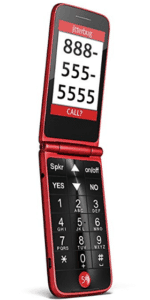
#8: A Cell Phone Is Your Friend
I know a major part of getting out and camping is often disconnecting from society. That’s not a problem, but a cell phone can be your friend. They are trackable by law enforcement in case you are lost (or find yourself in the extremely rare situation of being abducted – incredibly rare), and you can have yours turned off or even have a burn phone with a few basic numbers specifically for camping.
That way only emergency contacts can get a hold of you on that phone. You also still have an ability to call them if something goes wrong. Keep the number of people with this number limited, and let them know this is an emergency phone.
That way if it rings you know you need to answer, and if you call them, they know it’s important to get back to you or listen to that message they missed.
Some people use their regular cell phone and this is okay – especially if you’re not as concerned about disconnecting. However, there are several good reasons to go with a flip phone, in my opinion.
Personally I like having a toss away flip phone for this purpose because:
- I limit who can get a hold of me while out in the wild.
- Contacts save this number as “Emergency,” “HELP,” or a similar name – so they KNOW a call from here is important.
- I don’t lose my cell phone or business phone if I damage or lose this one.
- My eyes aren’t great despite being young – so I get the “old person” version to see numbers easier.
- Flip phones are harder to damage to the point of being non-functional.
In Conclusion
We firmly believe that spending time outdoors is an amazing way to re-connect with nature, meet interesting new people, and really enjoy everything that the world has to offer. This is a great way to make memories. The far majority of the time camping solo is safe.
This is true if you’re man, woman, young, old. Most people are good and there is a strong outdoor community wherever you go. That camaraderie of outdoor people is part of what I love about the outdoor life.
Make sure you meet every point on this list, until it becomes second nature. Take all the proper steps to protect yourself, and we’ll see you out there!

